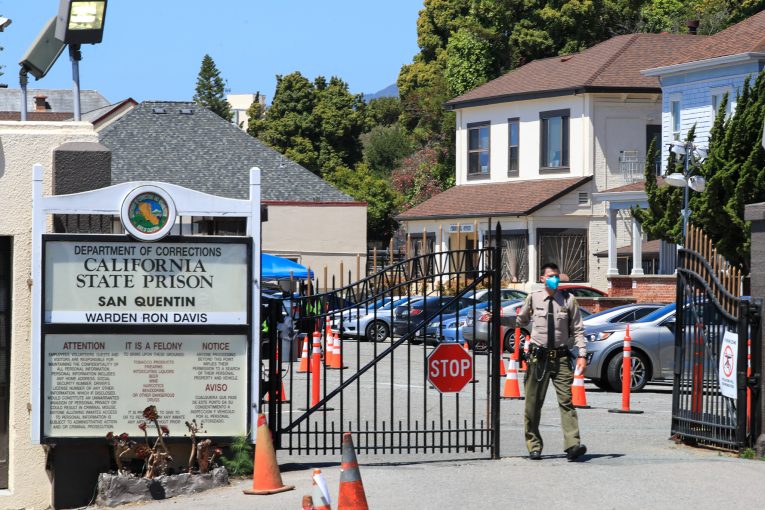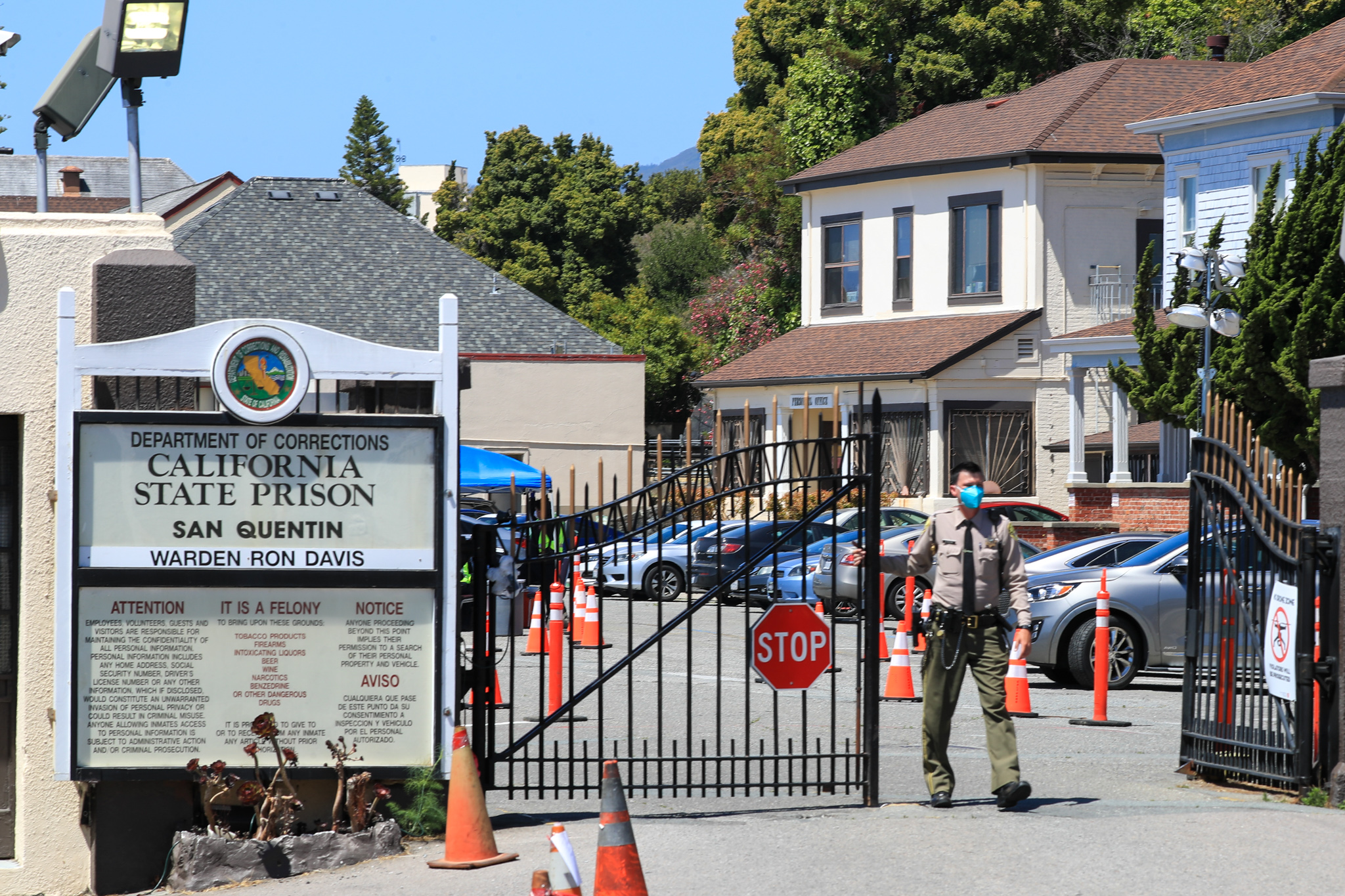

By Anika Khubchandani
MARIN COUNTY – After months of delays, San Quentin Prison habeas case to release prisoners in light of the threat to COVID-19 shows promise of moving forward efficiently with Marin County Superior Court Judge Geoffrey Howard’s expedited schedule after an attorneys conference Friday
Judge Howard said he plans to hold a weekly Zoom conference to discuss the proceedings on the San Quentin Habeas case after the meeting Friday that included about 15 attorneys working on behalf of the plaintiffs, but only one attorney, Denise A. Yates, from the Attorney General’s Office.
As a result, this case has faced many delays over the past several months, despite the urgent nature of the current COVID-19 conditions at the San Quentin Prison; however, the expedited schedule for the case put forth mainly by Judge Howard seemed promising.
Originally, the habeas corpus petitions – requests for a court to determine whether a person’s imprisonment is lawful – were filed separately by many prisoners over the month of July. These petitions argue that the 8th Amendment of the US Constitution’s prohibition of “cruel and unusual punishment” is being violated.
The plaintiffs requested in their petitions that they be immediately released in order to escape the unconscionable conditions caused by the California Department of Corrections and Rehabilitation  (CDCR).
(CDCR).
Currently, about 1,300 custody appeals have been processed along with an additional 588 inmate grievances processed as healthcare appeals. Due to the sheer number of cases and the immense amount of paperwork involved, an attorney on behalf of plaintiffs suggests to “resolve this issue by agreeing to a protective order” to avoid redundant discovery requests and unreasonable medical examinations.
On the other hand, Yates argued that “there are federal code regulations that prohibit” this due to the medical information involved in the case.
Judge Howard suggested to “stipulate to the number…of grievances that exist….as an alternative to producing documents.” This method will prevent additional paperwork that would be necessary to perform redactions on each of the additional healthcare grievances. Yates pushes back on this option aggressively.
Since the attorneys of the petitioners have not only received grievances directly from their clients, but also through subpoenas, they possess the grievance documents in an un-redacted form. On the other hand, Yates must go through the document request process to obtain these documents which leave her with a redacted format.
Due to the confusing nature of the location of and exact number of grievances, Judge Howard said he is “not exactly sure what to do about it, given where the case is in the calendar.”
He requested Yates to “produce a small subset of grievances” so that this sample can “form the basis of some sort of stipulation.” Yates is furious with having yet another task for the San Quentin case. She proclaims that she receives “150 emails a day on this case alone just about documents.”
Judge Howard concluded the discovery part of the meeting and moved on to discussing case management concerns.
All parties involved are in agreement that group 3 will be part of the hearing that will take place Oct. 26. Originally, only groups 1 and 2 of the lawsuit were to be included.
Judge Howard also assured attorneys on the call that a public access link will be created and accessible for further proceedings on the San Quentin case from now on.
Since petitioners raised the issue of non-testifying petitioners’ ability to watch the evidentiary hearing, the judge recognized “the general desire for petitioners to be able to see the proceedings;”
However, the judge did not feel comfortable with just issuing an order without knowing the procedures and conduct within the prison, and said he is inclined to “require respondents to provide an  explanation as to what is available and what can be done” and then make an order based on the information.
explanation as to what is available and what can be done” and then make an order based on the information.
Yates declared that “viewing is not a possibility” within the prisons, especially considering the pandemic and lack of social distancing. In response, the judge recommended petitioners’ counsel to provide a speakerphone so that the plaintiffs can hear the proceedings. “We will try to get it available for as many as possible,” the judge confirmed.
The petitioners also introduced the issue of increasing unmonitored phone access to 30 hours for the next week from 20 hours. Attorney Yates has always opposed increases in phone access by arguing that it is “time-consuming” and it will “disrupt prison operations.” Judge Howard decides her “objection is conclusory.”
Attorney Boyle – on behalf of the plaintiffs – shares how difficult it was for her to communicate with her clients because of overcrowding of the prison and limited hours for phone access.
She attempted to reach her clients on Sept. 4 and only heard back from them Sept. 30.
Attorney Yates retorted, “I am absolutely shocked that those words came out of your mouth.” Judge Howard intervenes and asks Yates to “keep it at a higher level.”
Judge Howard decides to increase phone access to 25 hours, taking into account the addition of group 3 to the Oct. 26 hearing.
The last item to discuss on Judge Howard’s agenda is the plan for the evidentiary hearing beginning on Oct. 26. He intends to be dark on Thursdays – utilizing this day for other preliminary hearings, scheduling hearings, and sentencing – but is available Monday through Wednesday in addition to Friday for the San Quentin case.
Depending on stipulations, the hearing is expected to be between 3-10 days. The attorneys representing the petitioners believe that the evidentiary hearing will be on the shorter side of the estimate. Yates, in contrast, claims that she will “be shocked if we are done by Thanksgiving.”
Briefly addressing the format of the hearing, Judge Howard expects counsel to keep opening statements concise to orient the court and then mostly go directly into witness testimony on Oct. 26. Lengthier opening statements will occur next Friday on Oct. 23 at 1:30 in the weekly Zoom meeting.
To sign up for our new newsletter – Everyday Injustice – https://tinyurl.com/yyultcf9
Support our work – to become a sustaining at $5 – $10- $25 per month hit the link:




